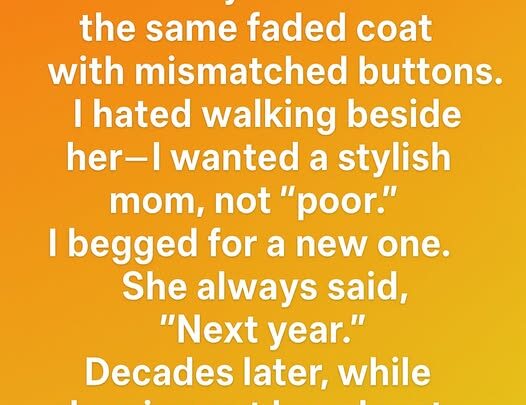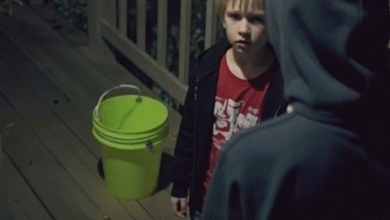Story
The Coat I Never Understood Until It Was Too Late

As a teenager, I used to roll my eyes every winter when my mom pulled out her same old coat. It was faded from years of wear, and some of the buttons didn’t even match anymore. I hated walking beside her in public. I wanted a stylish mom, one who looked like the other mothers—polished, confident, not “poor.” I remember begging her more than once to buy a new one. Every time, she would smile gently and say, “Next year, sweetheart.”
Back then, I thought “next year” was just her way of putting me off. I assumed she didn’t care how she looked. What I didn’t realize was that she was quietly teaching me what real love and sacrifice looked like—lessons I would only understand many years later.
Decades passed. My mom had grown older, her hair thinner, her hands more fragile. One afternoon, while helping her clean out her closet, I came across that same coat—the one I had despised as a teen. I held it up, noticing how the fabric had grown soft from years of use. The buttons were still mismatched, but suddenly, they looked like small badges of endurance rather than flaws.
When I slipped my hand into the pocket, I felt something unexpected—a small, worn envelope. My heart beat a little faster as I pulled it out. On the front, written in her familiar looping handwriting, were the words: “For a new coat—one day.”
Inside was a small amount of money, folded neatly, probably saved a little at a time. I stood there for a long moment, staring at the envelope, my throat tightening. It hit me all at once—she had been saving for that new coat, not because she didn’t want one, but because every time she got close, she must have chosen to spend the money on something else. Maybe new shoes for me, or a school trip, or groceries when times were hard. That coat had never been a sign of neglect or poverty. It had been a symbol of love—the quiet kind that doesn’t ask for recognition.
As I stood there in the silence of her room, memories began flooding back: my mom skipping meals so I could have seconds, working long hours at a job that paid too little, never complaining, never showing how tired she must have been. I remembered the brand-new gloves she bought me every winter, and how my backpack was always replaced before the school year began. All those times I thought she didn’t care about appearances, she was really making sure mine were cared for instead.
That realization broke something open inside me. I felt both deep regret and immense gratitude. How blind I had been. As a teenager, I only saw the surface—the faded fabric, the missing buttons. I didn’t see the woman underneath who had carried so much, sacrificed so much, and asked for nothing in return.
I carefully folded the coat and placed it back in the closet. My hands trembled as I did, because I knew I was holding something far more precious than just an old piece of clothing. It was a story—a living memory of her love stitched into every seam.
That same day, I went out and bought a brand-new winter coat. I didn’t buy it for myself, though. I donated it to a local shelter, leaving a small note inside the pocket: “In honor of a mother’s quiet love.” I hoped that somewhere, another mom would slip it on and feel not only warmth but also dignity.
And I kept my mother’s coat. Every mismatched button, every frayed edge, every faded patch stays exactly as it was. It hangs in my closet now, not as something worn-out, but as something sacred.
Each winter, when the air turns cold and I wrap my scarf around my neck, I think of her. I picture her walking beside me, wearing that old coat, smiling that same gentle smile. I whisper, “Thank you, Mom. Next year came for me because you gave up so many of yours.”
That coat taught me something that no fashion trend or luxury brand ever could: that love doesn’t need to be loud, or new, or perfect. Sometimes, the truest kind of love is stitched quietly into the fabric of everyday life—into the worn sleeves, the mismatched buttons, and the small sacrifices no one else ever sees.




